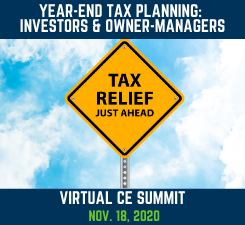Last updated: October 08 2020
A New Financial Conversation: Personal Health Risk Management

Terri Williams & Evelyn Jacks
The pandemic has brought a grim reality to personal financial planning: long term care is fraught with personal health risks. Canadians are worried about the care they will receive as they age, and it’s an issue that tax and financial advisors can help with proactively as part of purposeful year end tax planning. There are three issues to consider.
The Triggers for Discussion. The Global Pandemic has certainly raised awareness of the crucial need for quality care as Canadians age. In fact, seniors living in long term care homes have borne the disproportionate impacts and severe outcomes of COVID-19.
A study done this summer by the Canadian Institute for Health Information found that the proportion of Canadian COVID-19 deaths that have occurred in long-term care facilities is about twice the average of rates from other developed nations. More than 80% of our deaths have been seniors over 80 – that compares to an average of 42% among the 16 countries in Organisation for Economic Co-operation and Development - OECD. The proportion of LTC deaths ranged from less than 10% in Slovenia and Hungary to 31% in the United States to 66% in Spain.
This has caused Canadians to rethink their own plans for long term care and how to financially prepare for alternatives. It is a conversation they want to have.
The ideal client. Baby boomers are aging and will need care sooner rather than later. Boomers are typically classified as those born between 1946 and 1964. The last census showed us that 9.6 million persons, or close to 3 out of 10 Canadians (29%), were baby boomers. We have an aging population that’s expected to quadruple by 2 051. The first of the Baby Boomers are 66 years old right now and if it hasn’t come up recently, you may wish to ask:
051. The first of the Baby Boomers are 66 years old right now and if it hasn’t come up recently, you may wish to ask:
- Do you have a health care directive in place?
- Do you have a power of attorney in place?
- Do you have a will in place?
These questions can lead to deeper discussions about tax and estate planning.
The financial solutions. There are a number of financial solutions to consider. What’s right for your client depends on their net worth, their health, their age and their wishes for their elder care. Here are some options:
- Long term care insurance. Long term care insurance pays the insured a weekly or monthly income if they cannot do 2 of the 6 aids to daily living (ADL). ADLs are(for the most part): bathing, dressing, transferring, toileting, continence and feeding. Long term care insurance plans enable the insured to perhaps stay at home and hire private care to come to the house or the insured can use the payment to pay or help pay the rent for a long-term care facility.
- Critical illness insurance. Critical illness insurance provides a lump-sum payment if your client develops one of the policy’s covered critical illnesses (cancer, heart attack, and stroke being the most common). Types of dementia, including Alzheimer’s, are generally covered, though the policy may have an exclusion if there is a history of dementia in the family. Many critical illness policies have a term to age 65 or 75, although lifetime policies are available that last throughout retirement. One restriction of a critical illness policy is that a long-term care need that arises because of a non-covered condition will not result in a benefit being paid out. However, when a benefit is paid, the insured can use it however they want.
- Disability insurance is typically used to replace an income so it is definitely a must have for clients who are still working.
To learn more about these options, and other tips for personal health risk management, which should be a part of everyone’s financial planning, take the Financial Fallout Course which was a part of the September 30 CE Summit, but is still available online!
Additional educational resources: Attend Knowledge Bureau’s next live event for other financial planning tips: the November 18 Virtual CE Summit, focused on year-end tax planning for investors and owner-managers.
